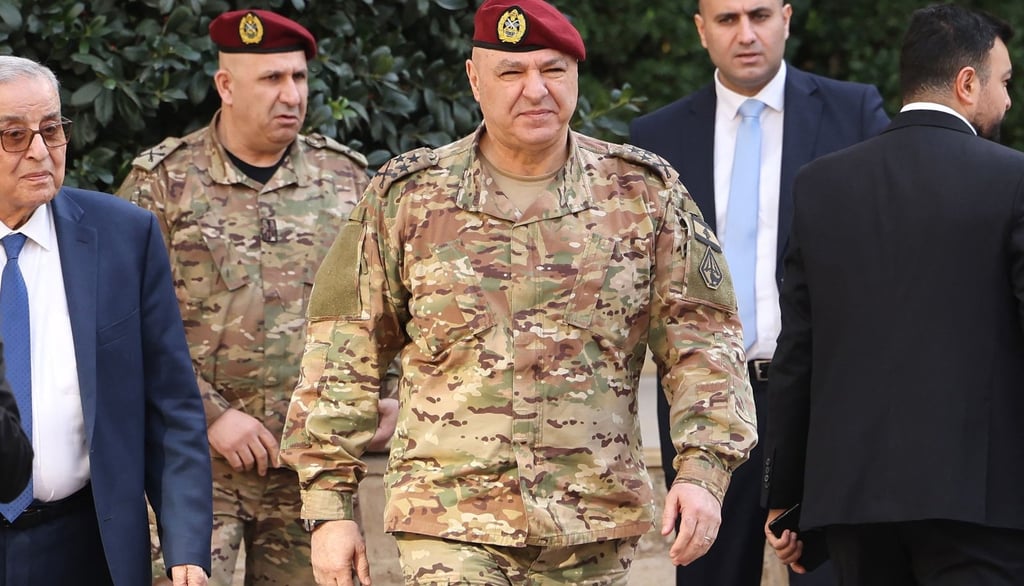Lebanon: What Joseph Aoun’s Presidency Means for the Perennially Crisis-Stricken Nation
Joseph Aoun’s presidency signifies a critical moment in Lebanon’s turbulent history. Elected after more than two years of political paralysis, the former military commander promises an era of change amid economic crises and regional shifts in sectarianism and political influence. Backed by international powers and domestic factions, Aoun’s leadership signals potential change but pre-existing corruption and Hezbollah’s uncertain future pose major obstacles to his goals. Can he break Lebanon’s cycle of strife and downturn, or will his presidency succumb to the same political forces that have continued to impede progress?
LEBANON
Raymond Puentes
2/14/20253 min read


After the two-year vacancy of Lebanon’s presidency, Joseph Aoun was elected as Lebanon's 14th president on January 9th. A career military officer, Aoun has played a crucial role in defending Lebanese sovereignty, leading decisive military campaigns against both foreign and domestic threats. His tenure as commander-in-chief of the Lebanese Armed Forces (LAF) since 2017 saw him spearhead operations against jihadist groups in the Beqaa Governorate, preventing them from gaining a foothold in the region. In later years, he also garnered public support through his speeches, in which he criticised the Lebanese government for the country's ongoing financial crisis and its impact on the military. His words quickly went viral on social media, with many viewing him as a champion of reform, a figure willing to stand against the corruption that has long plagued Lebanese politics.
When former president Michel Aoun (no relation) stepped down in December 2022, the country entered a political gridlock. Shortly after, many started to suggest Joseph Aoun as a potential successor. Several nations, led by the United States and France, held talks in which they agreed that Aoun would be a wise choice for the role. By 2024, he had secured near-unanimous support from factions across the political spectrum, an unprecedented achievement in Lebanon’s highly sectarian political landscape. In his inaugural address, Aoun reiterated his desire to combat political corruption, target organised crime, and address the deep-rooted religious sectarianism that has often caused civil unrest in Lebanon. Many Lebanese citizens took to social media to congratulate Aoun for his victory, voicing their support for his administration.
Joseph Aoun's rise to power comes at a very turbulent time in Lebanese history. Currently, Lebanon faces an unprecedented economic crisis, sectarian violence, increased military aggression from Israel, and civil unrest due to the aforementioned conditions. Lebanon’s role in Middle Eastern geopolitics is often underestimated due to its small size, but its strategic position in the Levant makes it a crucial player in regional affairs. The country sits at a crossroads between Western interests, Saudi influence, and Iranian-backed militant groups. Aoun understands these geopolitical pressures, and his actions since taking office indicate a careful balancing act between these competing forces.
One of Aoun’s first major political moves was the nomination of Nawaf Salam, a respected former judge at the International Court of Justice, as his prime minister. He was swiftly confirmed with a majority of votes from the Lebanese Parliament, signalling a shift toward political reform and a departure from traditional sectarianism. This political shift coincides with broader regional transformations, particularly the regime change in Syria. With the collapse of the Assad regime and the uncertain future of Hezbollah, Lebanon faces new security and diplomatic challenges. Some analysts believe that these events symbolise the waning influence of Hezbollah. If this proves true, Aoun's administration could signify a shift away from Ba'athism and other ideologies rooted in Islamic militarism toward a form of governance that emphasises pragmatism and reform. However, this is contingent on Aoun's ability to curb Iranian influence and mitigate political corruption. It remains to be seen how his presidency will mould Lebanon's future.
Despite his popular support, Aoun faces significant obstacles if he wishes to implement serious political reform. Entrenched political dynasties that have held sway over the country's affairs for decades will likely push back against serious attempts to combat corruption. Although Aoun retains popular support, this conflict could impede the future goals of his administration and lead to further political division. Furthermore, any figure who threatens the current system of wasta (a deeply rooted culture of nepotism and favouritism) risks provoking backlash from Lebanon’s elites. Increased pushback against this system and those who benefit from it could cause legal challenges or attempts to undermine Aoun's nascent presidency.
Joseph Aoun's presidency comes at an important crossroads in Lebanese history. Will it mark a pivotal moment of hope and change, or will Aoun succumb to the same allures of wasta and political corruption that previous presidents have profited off of? His presidency will likely define Lebanon’s trajectory for years to come, whether it be as the start of a long-overdue political transformation, or yet another chapter in the country’s cycle of crisis and stagnation. The stakes could not be higher for Lebanon's future, and only time will tell if Aoun is the promised reformer that his country so desperately needs.
Raymond Puentes is a Lead Analyst at Autran Group, specialising in Middle Eastern Affairs. Puentes is currently undertaking a Master's in Strategic Communication at Florida International University.
Email: rpuentes@autrangroup.com


